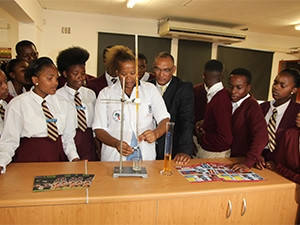
There is a science and mathematics crisis in SA that has been identified by learner achievement against international benchmark tests, together with results achieved by teachers in similar tests.
So says Professor Shaheed Hartley, director of the Science and Learning Centre for Africa in the faculty of education at the University of the Western Cape (UWC). He explains much of the analysis for this crisis points to maths and science teachers not having the right skills and resources to enable them to impart science and mathematics expertise to pupils.
Another factor which contributes to this crisis, he adds, is the lack of science laboratories at schools, a situation which he says paints a bleak picture of the future of education in SA.
To address this challenge, UWC opened three new science centres in schools in the province last week.
According to UWC, through the partnership between the Garden Cities Archway Foundation and the UWC's Science Learning Centre for Africa (UWC-SLCA) around R700 000 was injected towards each science centre on the premises of schools that severely lack infrastructure for proper science teaching.
Over the years, 32 science centres have been built in the Western Cape schools to date and the latest three were opened at Porterville Primary, Bellville Primary school and Bernadino Heights Secondary school.
Hartley explains this initiative is a combination of two projects - one is aimed at training teachers in maths and science and the other one is aimed at supporting learners in science activities, science projects and science clubs.
"We take an existing school classroom, fix it, clean it up, paint it, add a work station and finally the equipment.
"Tools and equipment consist of test tubes, microscopes, glass beakers, graduated cylinders, triple beam balances, stands and more," reveals Hartley.
He emphasises the importance of teachers undergoing training prior to teaching pupils.
"We needed to put the basics in place and teacher support is vital to enable them to teach science from an advanced level of understanding, knowledge and teaching skills is needed to address this national crisis.
"The labs provide a creative space to build a culture where science teaching and learning takes place, learners also hold their regular science clubs meetings there," he points out.
He adds developing a culture of science teaching amongst science educators and learners will be the starting point in improving National Senior Certificate results.
"The conducive environment provided by the science learning centres is a step in the right direction," he says.
Creating an ethos of collaboration is essential to the development of science and learning. The different science centres will be connected to each other using a programme called Bridget, which is similar to Skype, "but much better and much more stable".
"What happens is that I can stand in my lab at the university and I can talk and teach in my lab and they can see me, hear me and interact with me," said Hartley.
"The laboratories were designed in such a way that other, non-science subjects could also be taught in them".
An additional five science learning centres are due to be constructed by the end of the year.
Garden Cities Archway Foundation chairperson Myrtle February says the foundation had initially started building halls at disadvantaged schools, but after they were approached by UWC-SLCA they shifted their focus to science centres.
Share